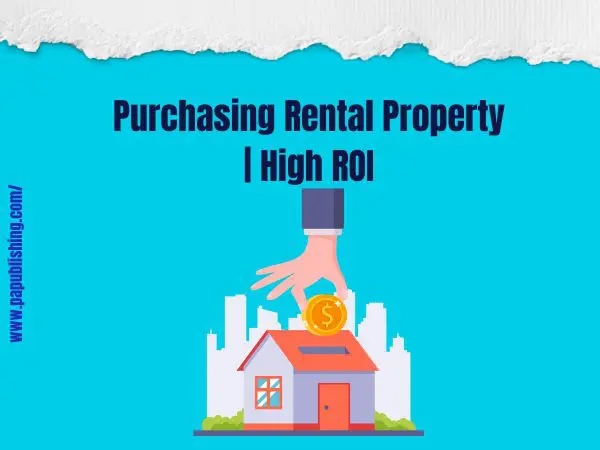Purchasing Rental Property | 9 Steps for Better ROI
Owning rental property is a great way to generate passive income and build long-term wealth. It provides financial stability and has a huge potential for a significant return on investment. However, purchasing rental property isn’t an easy one. You have to consider plenty of factors, from market research to securing financing options, to ensure you make a wise investment. But don’t stress out.
This article is your step-by-step guide on purchasing rental property and how it benefits you. Let’s dig in!
Step-by-Step Guide on Purchasing Rental Property
The following are the steps that make your purchasing rental property experience a breeze:
Set Your Goals
First things first—when purchasing rental property, you should have clear goals. These are the things you want to achieve from the rental property. So, what do you want? Are you looking for a steady, long-term income?
Or do you want to maximize your capital gains? The goals you have will help you narrow down properties that align with your objectives and ensure that you have realistic expectations for your investment.
Do Proper Market Research
Well, purchasing rental property isn’t an easy process and requires extensive research. You have to read books on real estate, connect with fellow realtors, and learn about the market conditions in your area through social media platforms like Facebook groups.
You should also get an idea of what properties are available in an area and analyze which properties are higher priced and which are low priced. For instance, suppose you aim to invest in rental property in an area where the crime rate is lower, income levels are good, and quick access to basic amenities. It can be a big plus if food item prices and medical facilities are affordable.
You should then expect a high investment and a good ROI for such properties. However, if you overlook these factors, you’ll have a less desirable investment.
Forecast Your Cash Flow
Before investing in any rental property, you should have a rough estimate of the cash flow it will bring. This will help you understand if the investment is going to be profitable and sustainable in the long term.
Generally, cash flow is the difference between the rental income a property brings in and the cost of running and maintaining it, including inspection, repairs, and mortgage.
It’s said that rental properties often bring a cash flow of 7% to 8%. This means that if you buy a property for $230,000, the cash flow for it should be around $16,100 to $18,400 annually.
Collect the Money
Next up, you are required to arrange your finances. Nonetheless, getting money to buy rental properties, especially if you are just entering the real estate world, can be quite a hassle. However, the following are some options that you can explore to finance your rental property:
Contact a Lender
You should contact a bank or a lender in your area and request them for a loan. They may look at your details like bank account statements, retirement funds, and credit card scores.
Typically, you’ll be required to pay at least 20% as a down payment, but if you buy a multi-unit home and live in one of the units, you can expect the downpayment to be as low as 3%. However, if your credit score is way below the ideal 640, you may be unable to secure a loan from a bank or a lender.
Ask Another Investor
Another way to finance your rental property is to ask another investor whose interest in real estate. You can get the payment from them and pay them back a small amount of the rental property ROI.
The investor can be another professional from the real estate market or your close friend. Just make sure you can trust them and seek legal advice before finalizing the deal.
Start Looking for Properties
Now that you’ve figured out the financing, you should start looking for properties. For this, you should go through:
- On-Market Listing: It’s advertised to the general public, and prices are transparent. However, as it’s public, the competition is also quite high.
- Off-Market Listing: These listings are confidential with less competition and have flexible pricing which is a win-win for rental property buyers.
Remember, while looking for rental properties, you should also connect with a reliable real estate agent. Share your preferences, budget, and expected cash flow with them. They have access to huge MLS listings and datasets, making sure you find the desired property within minimum time.
Make the Offer
Here comes the most exciting stage — once you’ve selected the ideal rental property, carried out inspections, you should make an offer to the seller. If they accept, you’ll have to pay 1% of the total property value as an earnest money.
For instance, if you are buying a property for $24,0000, you will be required to pay around $2,400 in earnest money.
It’s like a surety for the seller that you are serious about the property. However, this amount is refundable if you back out for genuine reasons like issues found during inspection or problems with the plumbing system.
Do the Final Paperwork
Just do the final paperwork and ensure compliance with legal laws and regulations. You can also hire a rental property manager to make this process hassle-free, as they take care of the paperwork and supervise necessary repairs before putting the property on sale. They also help you in screening potential renters, collecting rent, and handling the eviction and turnover process, so you take a backseat and enjoy investment returns.
Benefits of Purchasing Rental Property
Here are some amazing benefits of purchasing rental property:
Passive Income
Who doesn’t like the idea of generating income by doing no work? Everyone does!
So, one of the most common benefits of purchasing rental property is that it becomes your passive source of income. Especially if the rent of the property is enough to cover all expenses required to maintain and manage it, as well as enabling you to save some extra money, you can enjoy a steady stream of income.
This financial cushion allows you to focus on other rental investments and hobbies or simply enjoy your free time.
Tax Benefits
Another benefit of purchasing rental property is tax benefits. If you own a rental property, you can claim many of the home expenses as tax deductions. For instance, you can deduct mortgage interest, insurance costs, and property repairs. As a result, your overall tax burden is reduced, allowing you to retain more of your rental income.
Enhance Property Value Over Time
Your rental property is a valuable asset that will be appreciated over time. So, in addition to getting rent from tenants, you can even sell the property for a higher amount in the future. Just make sure the property is pristine and well-maintained, as this also enhances its overall value.
Conclusion
Purchasing rental property is indeed a great investment as it becomes your passive income source and offers tax benefits. However, ensure you understand the rental property landscape perfectly and collaborate with a reliable real estate agent to seal the perfect deal for your dream investment. Want to know more about rental property and how you can manage it? Visit PaPublishing today and get insights into rental properties’ best practices and market trends to maximize your profits.






